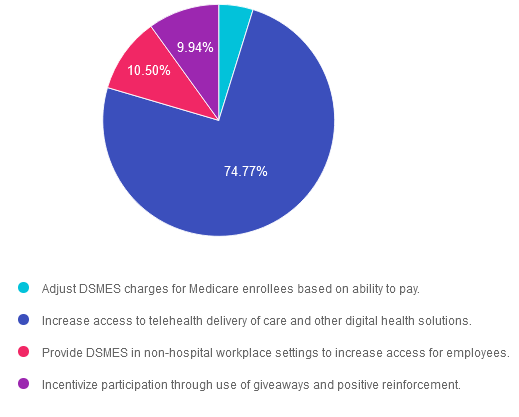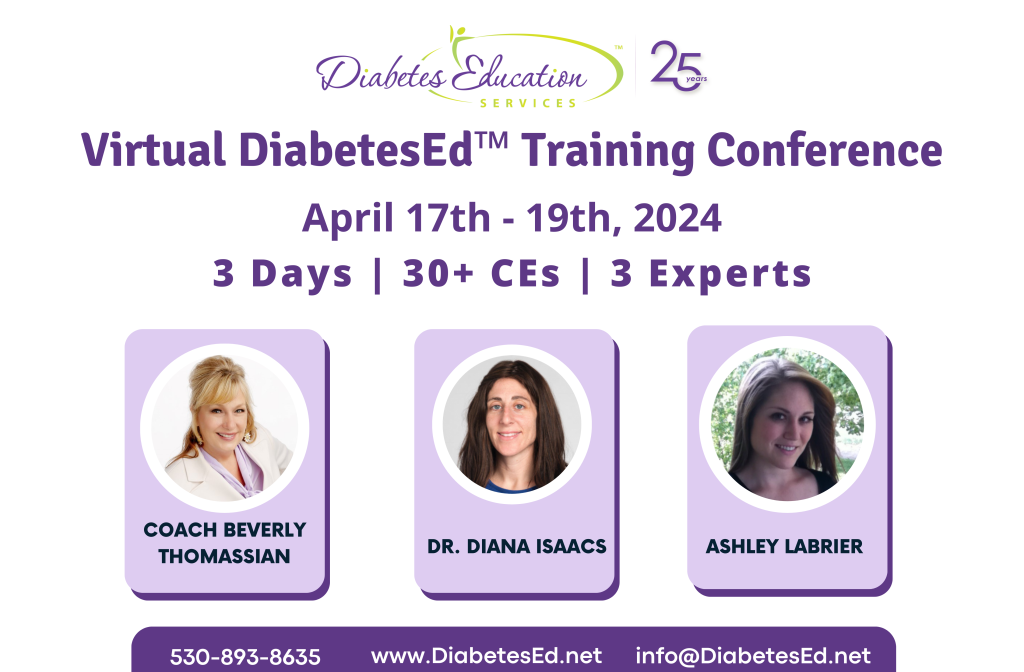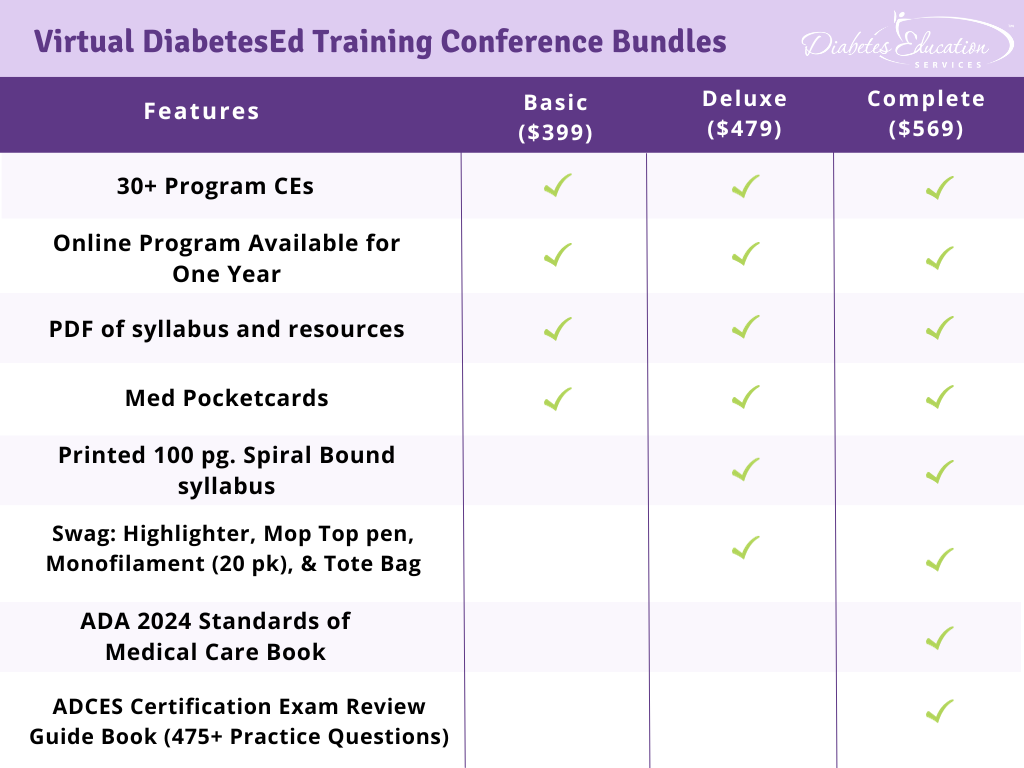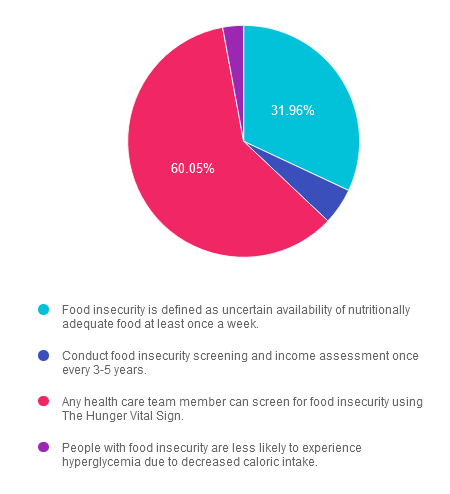Rationale of the Week | How to Increase Participation in DSMES?
Positively Type 1: A Holistic Perspective for Diabetes Educators
Question of the Week | Which statement is accurate regarding treatment of steatosis?
Rationale of the Week | Assessing for Food Insecurity with Diabetes
Plant Based Diets – What Approach is Best?
The health benefits of plant-based diets are not a new topic, but as they continue to be a top headline in the news and on social media, #plantbased, we have more and more clients expressing interest in this dietary pattern.
When JR asks, “I just read about a plant-based diet; do think I have to avoid all meat?” What are we to answer?
Plant-based diet is a general term to include eating patterns that emphasize whole grains, legumes, vegetables, fruits, nuts and seeds, and discourage animal products. The popularity of this diet has grown as more evidence associates it with lower rates of hypertension, hyperlipidemia, cardiovascular mortality, obesity, cancer, and the prevention of type 2 diabetes.1 Research has also associated a higher intake of meat and processed meat with an increased risk of these similar chronic diseases.1 Definitions of plant-based can vary widely from avoiding all animal products to reducing intake of animal-based foods; Mediterranean, DASH diet, and Planetary diet approaches may fit within this definition.

Different Types of Plant Based Diets Include:
- vegan (avoiding all animal products),
- lacto-vegetarian (including only dairy),
- lacto-ovo-vegetarian (including dairy and eggs),
- pesco-vegetarian (including fish and often dairy and eggs),
- or flexitarian (occasional consumption of meat, dairy, and/or fish).
As we review articles and noteworthy news, we might ask ourselves what plant-based definition has been used.
A vegan Diet, in persons with type 2 diabetes, is effective in reducing HgbA1c and body weight.1 The 2019 Nutrition Therapy for Adults with Diabetes or Pre-Diabetes Consensus report2 stated that a vegetarian or vegan diet can reduce A1c by 0.3-0.4% in people with type 2 diabetes, and plant-based eating patterns reduce weight, waist circumference, and LDL. A 2017 systemic review and meta-analysis3 of 14 studies found in 8 observational studies that vegetarian diet patterns (excluding meat and meat products) reduced the prevalence and incidence of type 2 diabetes compared to Omnivore diets. In five studies, no significant associations between a vegetarian diet and diabetes risk were observed, however, lack of definition of the degree of vegetarian, duration and actual intake, or specificity in diet quality could have affected the results.
A plant-based diet may not always be healthful, as it could include refined grains, starches, sugars, and processed plant-based products. Refined carbohydrates and highly processed foods are independently associated with a higher risk of type 2 diabetes. The ADA Standards of Care emphasize diet quality in every reviewed eating pattern. A 2019 meta-analysis4 of 9 total observational studies (307, 099 total participants) across North America, Europe, and Asia found that greater adherence to a plant-based diet was inversely associated with risk with diabetes, and this risk was further reduced when considering diet quality. In this study, it is essential to note that, when studies were combined, even the highest category of adherence to plant-based dietary patterns still included about 1.6-4 servings of animal-based foods per day; this may be from fish, dairy, meat, or poultry.4
Comparison Study: A 2024 cross-sectional study5 completed in Germany compared vegans, flexitarians (up to 50 grams of meat or processed meat products per day), and omnivores (>170 grams/day of meat and processed meat consumption). The vegan diet was associated with the most significant benefits to cardiovascular health; however, metabolic syndrome score and arterial stiffness were more favorable in flexitarians than in other groups. The vegan and flexitarian diets were associated with lower blood lipids, reduced insulin resistance, and a higher diet quality index than the Omnivore diet. Dietary intakes of soft drinks, dairy products, sweets, meat, and processed meat were all associated with higher total and LDL cholesterol levels and Metabolic syndrome scores. However, regarding how the study categorizes food groups, we are unsure if the type of meat or dairy would have changed these outcomes. Simple categories of plant-based or omnivore may not fully explain the synergy of health impacts from diet intake.
What are Americans eating now?
Transitional dietary approaches that emphasize foods primarily from plants while also including animal foods may be a more realistic approach for many people. Despite the increasing interest in plant-based diets and a 54% growth in 2023 of plant-based product sales in the US market, only about 4% of Americans follow a vegetarian diet. Data from a recent March 2023 publication7 compared average consumption from 17 food categories to the Dietary Guidelines for Americans recommendations. Many categories fell short, with only refined grains, added sugars, proteins, and nuts, seeds, and soy meeting or exceeding the guidelines. There is a need for an overall shift in diet to improve the intake of foods touted as beneficial within plant-based diets.
Barriers to implementing a plant-based diet include lack of knowledge, cultural acceptability, and cost.7
Like JR, many people may need to learn what it means to follow a plant-based diet. Understanding the individual’s interest, discussing the range of definitions and outcomes, and emphasizing transitional dietary changes could empower change.
- All-or-nothing thinking can hinder change; reducing total meat consumption while focusing on other aspects of diet quality (reduced refined grains or sugar) can also provide health benefits.
- JR motivations, interests and other clinical conditions will direct our recommendations. He reports that he has never tried “vegan foods.” Reviewing with JR the food choices he is making that fit within the plant-based diet, discussing meal modifications, and providing new recipes may support confidence while exploring new flavors and dietary changes. (Check out the resource list for recipe ideas).
- Cost is another barrier that we must take into consideration. The 2023 article in Nutrients5 reported that consumption of “healthier” versus “less healthy” diets had a higher price difference per person than typical dietary patterns. Low-cost empty-calorie foods explained much of this cost difference and not necessarily animal-based proteins. Finding affordable food items can improve diet implementation.
- One suggested alternative is incorporating recipes that include frozen fruits and vegetables, bulk grains, and dried or canned beans which can have a lower cost per calorie than meat-based foods.
The benefits of plant-based diets are well known, and future research is needed to examine different plant-based diet variations, combinations of foods, and degrees that are most beneficial and achievable. The 2024 American Diabetes Association Standards of Care emphasizes that there is no one-size-fits-all approach to dietary recommendations, and we need to individualize our recommendations based on cultural background, personal preferences, co-occurring conditions, and socioeconomics. They recommend “food-based dietary patterns should emphasize key nutrition principles: inclusion of non-starchy vegetables, whole fruits, legumes, whole grains, nuts/seeds and low-fat dairy products and minimizing consumption of meat, sugar-sweetened beverages, sweets, refined grains, and ultra-processed foods.”8
Strategies to Increase Plant Food Intake
We can support persons with diabetes and JR by asking questions and being curious.
- “Tell me what interests you in a plant-based diet?”
- “What is your current diet intake, and what modifications are realistic for you now?”
- “Are you interested in modifying the types of foods you are consuming and learning about incorporating more plant-based food choices?”.
Based on JR’s response, we can confidently support a dietary pattern that is vegan, vegetarian, or a more flexible nutritional pattern that focuses on nutrient density and food quality.
Blog contributed by nutrition expert Christine Craig, MS, RDN, CDCES
References:
1. Sabrina Schlesinger; Diet and Diabetes Prevention: Is a Plant-Based Diet the Solution?. Diabetes Care 2 January 2023; 46 (1): 6–8.
2. Alison B. Evert, Michelle Dennison, Christopher D. Gardner, W. Timothy Garvey, Ka Hei Karen Lau, Janice MacLeod, Joanna Mitri, Raquel F. Pereira, Kelly Rawlings, Shamera Robinson, Laura Saslow, Sacha Uelmen, Patricia B. Urbanski, William S. Yancy; Nutrition Therapy for Adults With Diabetes or Prediabetes: A Consensus Report. Diabetes Care 1 May 2019; 42 (5): 731–754
3. Lee Y, Park K. Adherence to a Vegetarian Diet and Diabetes Risk: A Systematic Review and Meta-Analysis of Observational Studies. Nutrients. 2017 Jun 14;9(6):603.
4. Qian F, Liu G, Hu FB, Bhupathiraju SN, Sun Q. Association Between Plant-Based Dietary Patterns and Risk of Type 2 Diabetes: A Systematic Review and Meta-analysis. JAMA Intern Med. 2019;179(10):1335–1344.
5. Bruns, A., Greupner, T., Nebl, J., & Hahn, A. (2024). Plant-based diets and cardiovascular risk factors: a comparison of flexitarians, vegans and omnivores in a cross-sectional study. BMC Nutrition
6. U.S. consumers’ eating patterns differ from Federal recommendations downloaded on 2/14/2023 fromhttps://www.ers.usda.gov/data-products/chart-gallery/gallery/chart-detail/?chartId=106562.
7. Viroli G, Kalmpourtzidou A, Cena H. Exploring Benefits and Barriers of Plant-Based Diets: Health, Environmental Impact, Food Accessibility and Acceptability. Nutrients. 2023 Nov 8;15(22):4723.
8. American Diabetes Association Professional Practice Committee; 5. Facilitating Positive Health Behaviors and Well-being to Improve Health Outcomes: Standards of Care in Diabetes—2024. Diabetes Care 1 January 2024; 47 (Supplement_1): S77–S110. https://doi.org/10.2337/dc24-S005
Checkout these websites with more information:
- Carbohydrate Factors; A Precise for Method for Meal Planning » an incisive article by a leader in nutrition therapy, Dana Armstrong, RD, CDCES. Dana describes an easy and accurate method for determining carbohydrate content of food beyond label reading. (do we use this anymore?)
- Diabetes and Diet: Food can be powerful in preventing and reversing diabetes. However, dietary approaches have changed as we have learned more about the disease. Published by the Physicians Committee for Responsible Medicine.
- Plant-based nutrition for healthcare professionals: implementing diet as a primary modality in the prevention and treatment of chronic disease.
- Low Fat Vegan Diet Improves Glycemia and CV Risk in Type 2 Diabetes » Diabetes Care 2006
- Plant-based diet may benefit patients with diabetes – Smart Brief: Plant-based food articles (update title)
- Nutritional Update for Physicians: Plant-Based Diets » Philip J Tuso, MD; Mohamed h Ismail, MD; Benjamin P ha, MD; Carole Bartolotto, Ma, RD Perm J 2013 Spring;17(2):61-66
- Preparing to Prescribe Plant-Based Diets for Diabetes Prevention and Treatment » Treatment of Type 2 Diabetes Plant-based eating patterns combined with exercise have been found to improve diabetes control and reduce the need for medication in intervention trials as far back as 1976.
- Vegetarian Starter Kit an easy to read and colorful handout for patients interested in learning more about a vegetarian diet. Published by the Physicians Committee for Responsible Medicine.
- Vegan Cooking – Lose the Eggs, Milk and Butter>> This article outlines vegan cooking using flax seed, tofu, soy yogurt, Ener-g egg replacer and bananas.
- Meatless Monday Campaign – https://www.mondaycampaigns.org/meatless-monday
- VegWeb: https://vegweb.com/recipes/
Videos
- Forks Over Knives » feature film which examines the profound claim that most, if not all, of the degenerative diseases that afflict us can be controlled, or even reversed, by rejecting animal-based and processed foods (available on Netflix).
- Reversing Diabetes » by Neal Barnard (move this up to here, it is a video)
- Engine 2 Diet » by Rip Esselstyn (this is also a video)
Reading
- The China Study » The Most Comprehensive Study of Nutrition Ever Conducted And the Startling Implications for Diet, Weight Loss, And Long-term Health by T. Colin Campbell
- Whole: Rethinking the Science of Nutrition » by T. Colin Campbell
- Breaking the Food Seduction » by Neal Barnard
- The Cancer Survivor’s Guide » a comprehensive text on the scientific link between diet and cancer, the benefits of a plant-based diet, including nutrition information, and more than 130 easy and delicious recipes. (free)
- Veggie Nice Recipe Book >> Veggie Nice gives you a month’s worth of meatless main-dish recipes.
- Nourish: The Definitive Plant-Based Guide for Families by Reshmah Shah, MD MPH and Brenda Davis, RD
- Plant-Based Nutrition: The Idiot’s Guide
Website Resources
- Dr. John McDougall based in Santa Rosa, California » (has a great newsletter)
- Vegetarian Starter Kit (English and Spanish) » whys and how’s of a healthier diet, the New Four Food Groups guidelines, practical tips for beginning a vegetarian diet, and delicious low-fat, no-cholesterol recipes. This has been updated per above.
- Plant Based Plate Method » Physicians for Responsible Medicine version of the USDA “Plate Method” which includes low fat, plant-based foods.
- The Vegetarian Resource Group: https://www.vrg.org
- Food and Plant: Planetary Diet Resources https://foodandplanet.org/
- Plant-based prevention of disease organization: https://www.preventionofdisease.org/
- Plant Based Eating Resource Page
Take Education Courses
- Nutrition Therapy and Exercise
- PCRM Nutrition CME (free CMEs)
- Certificate in Plant-Based Nutrition, provided by eCornell.
Menus and Recipes
Menu Planning –
- Recipes: Week 3 >>
Accreditation: Diabetes Education Services is an approved provider by the California Board of Registered Nursing, Provider 12640, and our CPEU courses have received Prior Approval* from the Commission of Dietetic Registration (CDR), Provider DI002. Since our CPEU courses received Prior approval* from the CDR, these CPEU courses satisfy the CE requirements for the CDCES /BC-ADM regardless of your profession!
The use of DES products does not guarantee the successful passage of the certification exam. CBDCE and ADCES do not endorse any preparatory or review materials for the CDCES or BC-ADM exams, except for those published by CBDCE & ADCES.
Question of the Week | How to Increase Participation in DSMES?
Upcoming webinars | FREE Behavior Change Theories & 2024 CDCES Exam Prep

Be a part of our diabetes community while learning about the latest in diabetes care.
Plus, Coach Beverly provides an interactive question and answer session at the end of each live webinar.
FREE – Behavior Change Theories Made Easy
Airs live on March 20, 2024, at 11:30 am PT

Topics:
- Describe 4 of the most common behavior change theories.
- Discuss how to apply these theories in clinical practice.
- List the steps in the transtheoretical model
- Have fun testing these theories out in real life.
Keeping all the behavior change and learning theories straight can be daunting, especially if you are trying to get to the “best” answer for certification exams. Coach Beverly feels your pain and wants to help out. To say thanks for 25 years, she’s hosting a FREE Behavior Change Webinar to sort out and dissect the theories most relevant in clinical practice and for exam preparation.
Can’t make it live? No worries. We will send post the recorded version to the Online University within 24 hours of the broadcast
Instructor: Beverly Thomassian RN, MPH, CDCES, has been Board Certified in Advanced Diabetes Management for over 20 years. She is an Associate Clinical Professor at UCSF, a working educator, and a nationally recognized diabetes expert. She has a Master’s Degree in Public Health from UCLA, with a focus on behavioral health and education.
Enroll for FREE (No CEs) or for $19 to Earn 1.0 CEs
FREE Webinar! 2024 CDCES Exam Prep
Airs live on March 21, 2024, at 11:30 am PT

Topics:
- Exam requirement updates for 2024.
- Exam eligibility and new test format starting in July 2024
- Strategies to succeed along with a review of study tips and test-taking tactics.
- We will review sample test questions and the reasoning behind choosing the right answers.
- Learn how to focus your time and prepare to take the CDCES Exam. We provide plenty of sample test questions and test-taking tips!
3 Reasons to Become a CDCES
“The best part of becoming a CDCES is working with my colleagues and people living with diabetes. As diabetes educators, we hear compelling and beautiful life stories. I am astounded by the barriers they face and inspired by their adaptability, problem-solving skills, and resilience.“
– Coach Beverly Thomassian, RN, MPH, CDCES, BC-ADM
Reason 1: CDCES is a widely recognized certification by employers and health care professionals throughout the U.S. This credential demonstrates a specialized and in-depth knowledge in the prevention and treatment of individuals living with pre-diabetes and diabetes.
Reason 2: Currently, 13% of people in the U.S. have diabetes and another 36% have pre-diabetes which means 49% of Americans are running around with elevated blood glucose levels. Given this epidemic, there will be plenty of future job opportunities.
Reason 3: Having my CDCES along with my nursing degree, has opened many doors of opportunity; from working as an inpatient Diabetes Nurse Specialist in a hospital to working as a Manager of Diabetes Education in the outpatient setting to starting my own consulting company.
Can’t make it live? No worries. We will send post the recorded version to the Online University within 24 hours of the broadcast
Instructor: Beverly Thomassian RN, MPH, CDCES, has been Board Certified in Advanced Diabetes Management for over 20 years. She is an Associate Clinical Professor at UCSF, a working educator, and a nationally recognized diabetes expert. She has a Master’s Degree in Public Health from UCLA, with a focus on behavioral health and education.
Sign up for Diabetes Blog Bytes – we post one daily Blog Byte from Monday to Friday. And of course, Tuesday is our Question of the Week. It’s Informative and FREE! Sign up below!
Accreditation: Diabetes Education Services is an approved provider by the California Board of Registered Nursing, Provider 12640, and our CPEU courses have received Prior Approval* from the Commission of Dietetic Registration (CDR), Provider DI002. Since our CPEU courses received Prior approval* from the CDR, these CPEU courses satisfy the CE requirements for the CDCES /BC-ADM regardless of your profession!
The use of DES products does not guarantee the successful passage of the certification exam. CBDCE and ADCES do not endorse any preparatory or review materials for the CDCES or BC-ADM exams, except for those published by CBDCE & ADCES.
Upcoming webinars | Behavior Change Theories, 2024 Boot Camp Series

Be a part of our diabetes community while learning about the latest in diabetes care. Plus, Coach Beverly provides an interactive question and answer session at the end of each live webinar.
Behavior Change Theories Made Easy
Airs live on March 20, 2024, at 11:30 am PT

Topics:
- Describe 4 of the most common behavior change theories.
- Discuss how to apply these theories in clinical practice.
- List the steps in the transtheoretical model
- Have fun testing these theories out in real life.
Keeping all the behavior change and learning theories straight can be daunting, especially if you are trying to get to the “best” answer for certification exams. Coach Beverly feels your pain and wants to help out. To say thanks for 25 years, she’s hosting a FREE Behavior Change Webinar to sort out and dissect the theories most relevant in clinical practice and for exam preparation.
Can’t make it live? No worries. We will send post the recorded version to the Online University within 24 hours of the broadcast
Instructor: Beverly Thomassian RN, MPH, CDCES, has been Board Certified in Advanced Diabetes Management for over 20 years. She is an Associate Clinical Professor at UCSF, a working educator, and a nationally recognized diabetes expert. She has a Master’s Degree in Public Health from UCLA, with a focus on behavioral health and education.
Join us for our upcoming 2024 Boot Camp Series
Airs live February 13th – March 19th, 2024, at 11:30 am PT
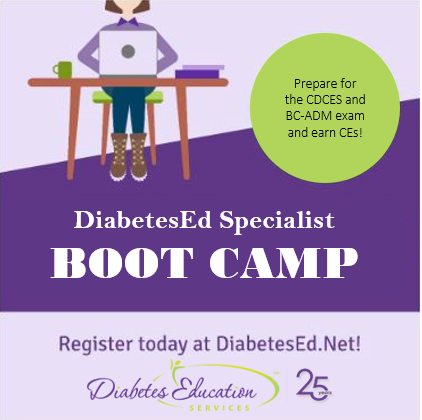
Class Topics & Webinar Dates:
- February 13, 2024 – Boot Camp 1: Diabetes | Not Just Hyperglycemia | 1.75 CEs
- February 15, 2024 – Boot Camp 2: Standards of Care & Cardiovascular Goals | 1.8 CEs
- February 20, 2024 – Boot Camp 3: Meds for Type 2 | What you need to know | 1.75 CEs
- February 22, 2024 – Boot Camp 4: Insulin Therapy | From Basal/Bolus to Pattern Management | 1.75 CEs
- February 27, 2024 – Boot Camp 5: Insulin Intensive & Risk Reduction | Monitoring, Sick Days, Lower Extremities | 1.75 CEs
- February 29, 2024 – Boot Camp 6: Medical Nutrition Therapy | 1.75 CEs
- March 12, 2024 – Boot Camp 7: Microvascular Complications & Exercise | Screen, Prevent, Treat | 1.75 CEs
- March 14, 2024 – Boot Camp 8: Coping & Behavior Change | 1.75 CEs
- March 19, 2024 – Boot Camp 9: Test-Taking Coach Session (48 Questions) | No CE
Intended Audience: This library of critical information is designed for individuals or groups of diabetes specialists, including RNs, RDs, Pharmacists, Nurse Practitioners, Clinical Nurse Specialists, Physician Assistants, and other health care providers interested in staying up to date on current practices of care for people with diabetes and preparing for the BC-ADM or the CDCES certification Exam.
Can’t make it live? No worries. We will send post the recorded version to the Online University within 24 hours of the broadcast
Instructor: Beverly Thomassian RN, MPH, CDCES, has been Board Certified in Advanced Diabetes Management for over 20 years. She is an Associate Clinical Professor at UCSF, a working educator, and a nationally recognized diabetes expert. She has a Master’s Degree in Public Health from UCLA, with a focus on behavioral health and education.
Christine Craig, MS, RD, CDCES, winner of the 2023 Impact on Diabetes Award, is a leader in the field of nutrition, technology, and diabetes care. Her years of expertise combined with her person-centered approach and work ethic, make her a perfect speaker for this nutrition and activity focused content.
Sign up for Diabetes Blog Bytes – we post one daily Blog Byte from Monday to Friday. And of course, Tuesday is our Question of the Week. It’s Informative and FREE! Sign up below!
Accreditation: Diabetes Education Services is an approved provider by the California Board of Registered Nursing, Provider 12640, and our CPEU courses have received Prior Approval* from the Commission of Dietetic Registration (CDR), Provider DI002. Since our CPEU courses received Prior approval* from the CDR, these CPEU courses satisfy the CE requirements for the CDCES /BC-ADM regardless of your profession!
The use of DES products does not guarantee the successful passage of the certification exam. CBDCE and ADCES do not endorse any preparatory or review materials for the CDCES or BC-ADM exams, except for those published by CBDCE & ADCES.




